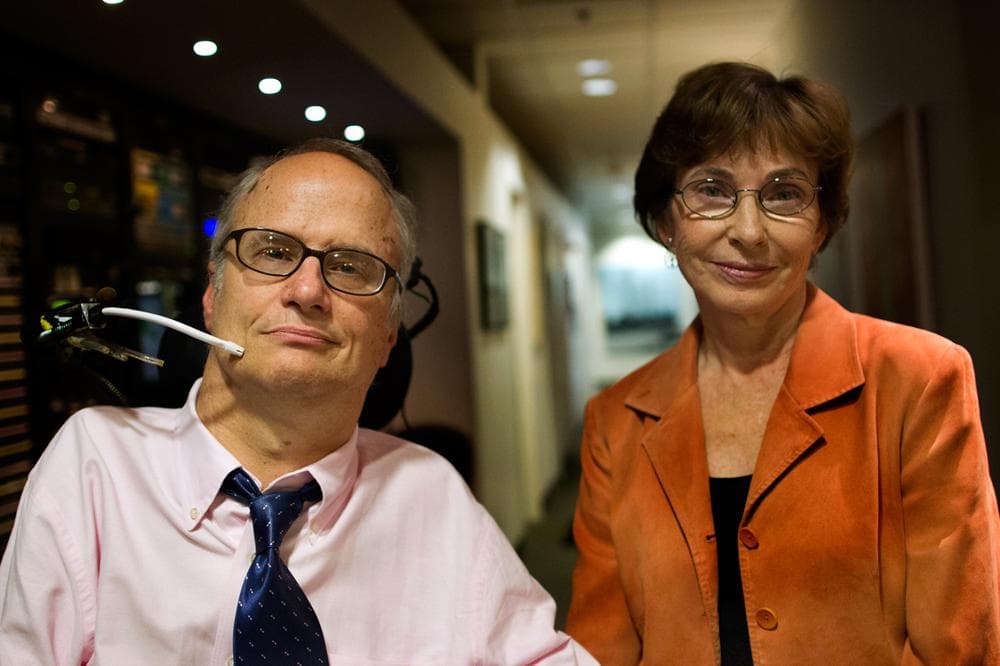Advertisement
Mass. Voters To Weigh In On 'Death With Dignity' Act

This November, Massachusetts voters will decide whether the state should allow physician-assisted suicide for some terminally-ill patients.
For a closer look, WBUR's Bob Oakes spoke with people on both sides. John Kelly, a disabilities activist and founder of the group Second Thoughts, opposes the ballot question. Dr. Marcia Angell, a senior lecturer at Harvard Medical School and former editor of the New England Journal of Medicine, supports it.
Dr. Marcia Angell: It's a compassionate law. It's also a law that respects the autonomy of dying patients. I can't see why anyone, any organization, any individual would possibly presume to tell someone else how much suffering they have to endure as they face death.
Bob Oakes: John Kelly has a different point of view. John, why do you want this question to fail?
John Kelly: We're talking about a social policy here, not just individual choices in a fairy tale land where everyone's affluent and has had full control over their lives their entire life, but people who are vulnerable, people with psychiatric illness, people who depend on care for family members who may not have their best interests at heart.
Dr. Marcia Angell: The best answer is the experience in Oregon, which has had the same law for now almost 15 years. And what they have found is that the people who use this law are not vulnerable people — except that they have terminal illness, of course — but that they tend to be more affluent, better educated, well insured and fully informed.
Bob Oakes: There's a lot of concern by families and patients at the end of life around the "when" question — when is the patient expected to die and how and whether a doctor really really knows when a patient's time is up so that that person might consider ending his or her life.
Dr. Marcia Angell: Here again the best evidence comes from Oregon. Over 80 percent of people who have used this law have had end stage cancer. Of the remaining less than 20 percent, most of those either had end stage Lou Gehrig's Disease or end stage emphysema. They knew. This is a lot more than a guess. Whether it was four months that they could have lived or six months, the point is they were dying...they were in agony and they wanted to hasten death because their suffering was intolerable.
Bob Oakes: John, why isn't Oregon's experience proof enough that it would be okay for Massachusetts to do this?
John Kelly: We really don't know much about what goes on in Oregon. The data shows very little. All we hear from are doctors who voluntarily report that they prescribe the drugs. Now Marcia says that doctors don't have to prescribe — why don't we hear from doctors who in their medical judgment are not prescribing this medicine? Instead, people go doctor shopping. Many of the relationships between patients and doctors are very short.
Bob Oakes: Dr. Angell, how do you keep a patient from doctor shopping if the doctor the patient is using at the moment doesn't want to participate?
Dr. Marcia Angell: A doctor should not then abandon the patient. It's right for the doctor, who for whatever reason decides not to participate, to refer the patient to another doctor. You just don't wipe your hands and walk out the front door.
Bob Oakes: As I understand it, there's no mental health evaluation required in order to participate. Should a mental health evaluation be required for patients who are requesting assisted suicide because shouldn't we want to know that it's not simply depression driving that decision, that it also might be the pain that person is under?
Dr. Marcia Angell: You have a situation that brings about sadness anyway. But if two doctors believe that it is affecting [the patient's] judgment, then they must refer to a mental health counselor.
John Kelly: Doctors don't seem to be thinking that many people need a referral. One out of 71 people last year were referred in Oregon for psychiatric evaluation.
Bob Oakes: Are you worried, Dr. Angell, that insurance companies will push for suicide in order to cut costs?
Dr. Marcia Angell: You have to trust the patient. If an insurance company says to a patient, "Hey, why don't you kill yourself?" the patient would say no. There is no evidence in Oregon that insurance companies have weighed in on this one way or the other.
John Kelly: What we have here is a $100 treatment that will be the cheapest. We already have serious cost cutting pressures. We constantly hear about the costs of caring for people in the last year of their lives. And out in Oregon, we saw Barbara Chandler and Randy Stroup, two people with cancer, who were prescribed chemotherapies by their doctor, denied by Oregon Medicaid because Oregon Medicaid decided that it could not financially cover those treatments. Instead, they received a form letter in which it was noted that they were eligibile for assisted suicide.
Dr. Marcia Angell: Argument by anecdote doesn't advance us very far. The data are overwhelming that this law is being used exactly as intended.
Advertisement
Bob Oakes: Is this necessary, considering that current law gives every person the right to refuse life saving treatment?
Dr. Marcia Angell: The fact is that this right is being used responsibly. And this law would apply to people to people who are not on some life sustaining treatment (like a mechanical ventilator) and who want some more active help in ending their lives.
John Kelly: Whatever alleged benefit there might be for a few is vastly outweighed by the dangers to the many and the change in consciousness that this bill calls for where death becomes a medical benefit.
This program aired on September 24, 2012.
